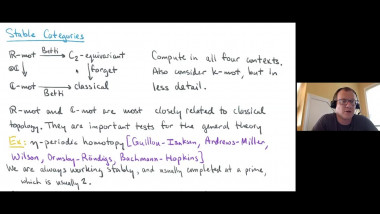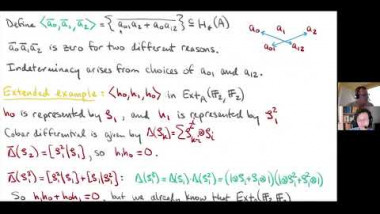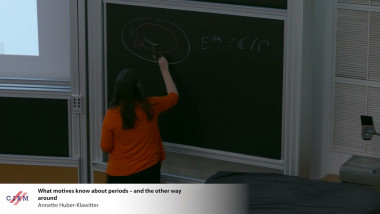1/3 Motivic and Equivariant Stable Homotopy Groups
I will discuss a program for computing C2-equivariant, ℝ-motivic, ℂ-motivic, and classical stable homotopy groups, emphasizing the connections and relationships between the four homotopical contexts.The Adams spectral sequence and the effective spectral sequence are the key tools. The analysis of these spectral sequences break into three main steps: (1) algebraically compute the E2-page; (2) analyze differentials; (3) resolve hidden extensions. I will demonstrate a variety of techniques for each of these steps.I will make precise the idea that ℂ-motivic stable homotopy theory is a deformation of classical stable homotopy theory. I will discuss some future prospects for homotopical deformation theory in general.
Here is a general reference for the topic of my presentations:D. C. Isaksen and P. A. Østvær, Motivic stable homotopy groups, in Handbook of Homotopy Theory, edited by H. Miller, Chapman and Hall/CRC (2019) 757–792. Here is a link to a page with several spectral sequence charts that are closely related to my talk: s.wayne.edu/isaksen/adams-charts/ a reference mentionned in the talk is available here:https://e.math.cornell.edu/people/jdq27/ a question about tmf: Lurie used ideas from derived algebraic geometry to construct the classical spectrum tmf. Can this program be transported into motivic homotopy theory? Can we construct "motivic modular forms" spectra over some class of base schemes? For a construction of mmf over the complex numbers, see B. Gheorghe, D. C. Isaksen, A. Krause, and N. Ricka, C-motivic modular forms, J. Eur. Math. Soc., to appear.














![[1242] Réfutation de la conjecture du télescope de Ravenel](/media/cache/video_light/uploads/video/SeminaireBourbaki.jpg)
![[1241] Théorie de l’homotopie motivique et groupes d’homotopie stables](/media/cache/video_light/uploads/video/Bourbaki.png)

